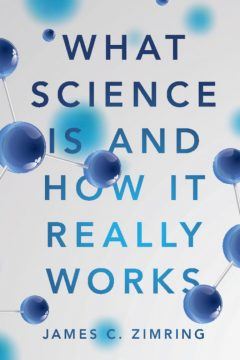James C. Zimring in The Scientist:
 Science seems under assault. Attacks come from many directions, ranging from the political realm to groups and individuals masquerading as scientific entities. There is even a real risk that scientific fact will eventually be reduced to just another opinion, even when those facts describe natural phenomena—the very purpose for which science was developed. Hastening this erosion are hyperbolic claims of “truth” that science is often perceived to make and that practicing researchers may themselves project, whether intentionally or not. I’m a researcher, and I get it. It seems difficult to explain the persistent success of scientific theories at describing nature, not to mention the constant march of technological advancement, without assigning at least some special epistemic status to those theories. I explore this challenge in my book, What Science Is and How It Really Works. If the history of science teaches us anything, it is that the ability of a theory to predict unobserved phenomena and lead to amazing new technologies is no proof that said theory is “true.”
Science seems under assault. Attacks come from many directions, ranging from the political realm to groups and individuals masquerading as scientific entities. There is even a real risk that scientific fact will eventually be reduced to just another opinion, even when those facts describe natural phenomena—the very purpose for which science was developed. Hastening this erosion are hyperbolic claims of “truth” that science is often perceived to make and that practicing researchers may themselves project, whether intentionally or not. I’m a researcher, and I get it. It seems difficult to explain the persistent success of scientific theories at describing nature, not to mention the constant march of technological advancement, without assigning at least some special epistemic status to those theories. I explore this challenge in my book, What Science Is and How It Really Works. If the history of science teaches us anything, it is that the ability of a theory to predict unobserved phenomena and lead to amazing new technologies is no proof that said theory is “true.”
For example, in addition to explaining the dynamics of the known solar system, Isaac Newton’s mechanics enabled stunningly accurate predictions of other astronomical phenomena, such as Halley’s comet arriving later than normal in 1759 due to the gravitational effects of passing close to Jupiter. Even more impressive, in the early 1800s when astronomers determined that the orbit of Uranus deviated from Newtonian predictions, they concluded that Newton’s theory was not wrong; rather, the existence of a previously unobserved planet was posited and was later found exactly where it was expected to be (and named Neptune). Such successes of the scientific revolution were so impressive that philosophers developed whole new theories of knowledge to try to explain how scientists appeared to have used observation and reason to discover fundamental truths. In doing so, both scientists and epistemologists attempted to dismiss what logicians have known since antiquity: that no amount of correctly predicted effects can prove a hypothesized cause. Attempts to do so commit the fallacy of “affirming the consequent”—in other words, scientific theories are always underdetermined by the available data.
More here.
